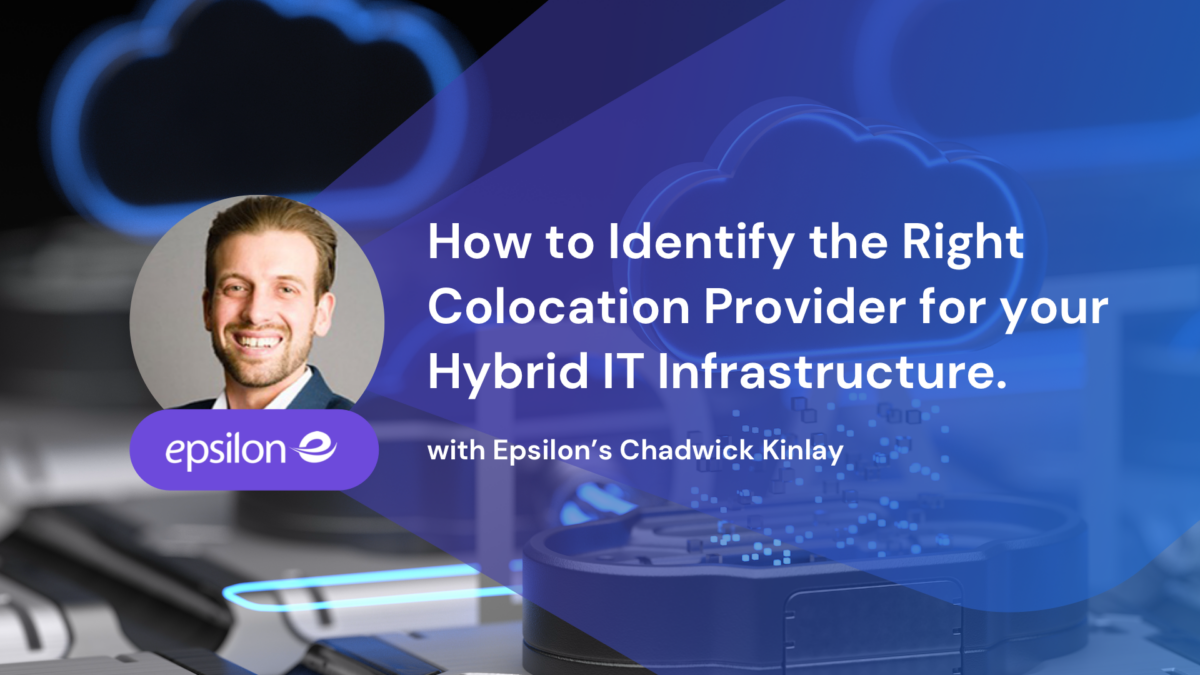How to Identify the Right Colocation Provider for your Hybrid IT Infrastructure with Epsilon’s Chadwick Kinlay
Expected to grow at a CAGR of 13.3% from now to 2028, the global data center colocation market is experiencing significant growth as organizations continue to navigate the digital complexities of the pandemic.
With this, colocation offerings are becoming more abundant – and thus more competitive – than ever before, making it harder for businesses to know which provider can best fulfil their evolving IT requirements.
So, we caught up with Epsilon’s Director, Marketing and Communications, Chadwick Kinlay, to share insights from the telecom company’s latest Colocation eGuide, and let us in on the best steps to identifying the right colocation provider for establishing a comprehensive hybrid IT infrastructure.
Benefits of deploying a hybrid IT infrastructure for your business
With the right provider in tow, organizations are able to unlock a multitude of network benefits when they develop their own hybrid IT infrastructure.
“This type of infrastructure can provide businesses with the flexibility and availability to seamlessly move basic workloads to the public cloud, while benefiting from added data security and privacy by keeping mission-critical data on-premises,” Kinlay says.
Businesses can tap into different Cloud Service Providers (CSPs) like Amazon Web Service (AWS), Google Cloud, Microsoft Azure and Oracle to spread their workloads and, in turn, also reap the unique benefits of each provider.
“This can create competitive offerings for customers, while retaining the same security and compliance standards,” Kinlay adds.
Considering affordability, reliability, and network scalability
Believing that colocation will almost always be more affordable than hosting your data on-premises, Kinlay says that a provider’s competitive pricing is an important consideration for many data-driven organizations who are looking to properly host their information systems.
“Businesses need to look at the most efficient way to deliver reliability and performance that meets financial goals and avoids significant costs associated with expanding in-house or cloud infrastructure,” Kinlay says, “and colocation can provide just that.”
The ability for a company to scale with the help of colocation offerings is another major incentive, according to Kinlay.
“Businesses need flexible solutions that allow them to ‘land and expand’ in new markets with highly scalable infrastructure,” he says.
“And in terms of reliability, on-premise data solutions don’t often have the best track record for uptime reliability due to their lack of efficient power and cooling infrastructure, so colocation can really help to overcome those internal challenges.”
Epsilon’s 8 “must-haves” for a comprehensive colocation ecosystem
According to Epsilon’s latest Colocation eGuide, organizations looking for a top-quality colocation provider should ensure that they offer these eight ‘must-have’ items:
- Strategic locations
- A comprehensive solution
- Built-in scalability
- Flexible commercial model
- Physical and digital security
- An interconnect ecosystem
- On-demand cloud connectivity
- Continually evolving capabilities
“All of these items play a vital role in ensuring businesses are getting an all-in-one colocation solution that goes beyond basic hosting,” Kinlay says.
“Providers should be able to deliver a whole ecosystem of global network solutions, enabling businesses to rapidly connect to other data centers, public clouds, and Internet Exchange Points (IXPs),” he says.
And, while organizations may not see the need for such large-scale interconnection today, systems and infrastructure like this are built with the future in mind, providing businesses with the opportunities to scale quickly and create overall network synergy.
Ultimately, to maximize the potential of colocation for your organization, choosing the right provider is critical. The likes of Epsilon are seeking to capture global businesses’ requirements when it comes to providing an affordable, reliable and sustainable colocation ecosystem that matches each organizations’ unique demands for their hybrid IT infrastructure.
Want to find out more?
Are you seriously looking to source the right colocation services for your business IT environment? Head to Epsilon’s page on Cloudscene to see what they can do for your organization, or reach out to Cloudscene’s team of experts in cloud and colocation, for assistance with your next network project.

Contributor – Chadwick Kinlay – Director, Marketing and Communications, Epsilon Telecommunications
He plays an instrumental role in developing Epsilon’s strategic marketing and communication plan with a focus on integrated global strategies for brand development.
Prior to Epsilon, he held various marketing positions across a broad set of industries including Banking, Hospitality, and Pharmaceuticals.
Chadwick received his Bachelor of International Business majoring in Business Management and Marketing from Macquarie University in Sydney, Australia.
